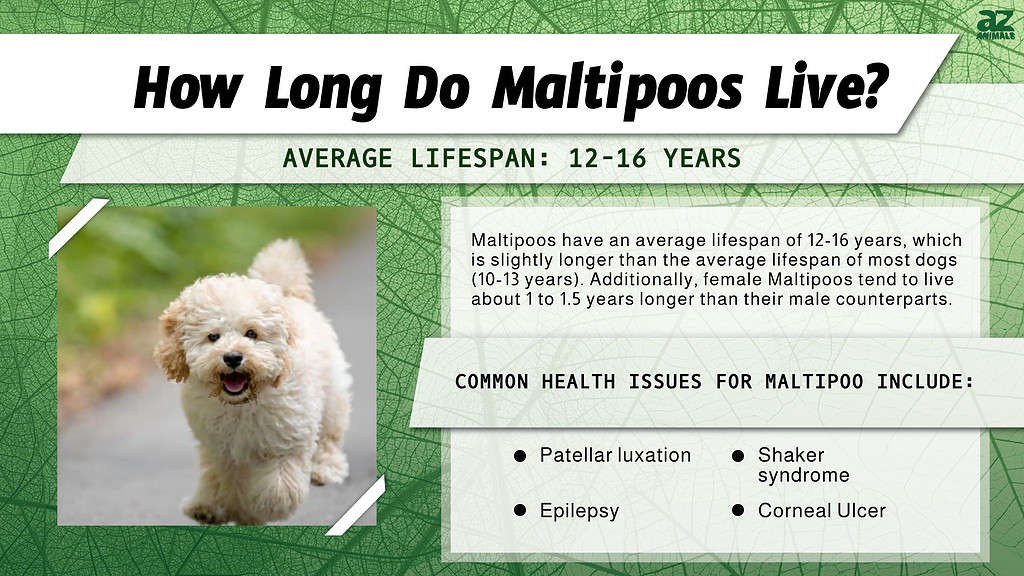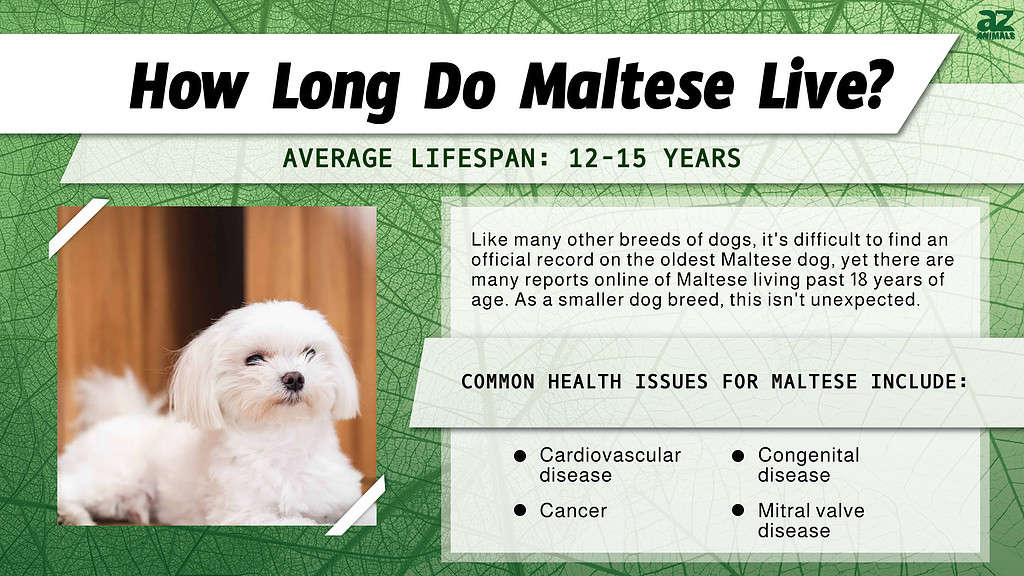Are you curious about the lifespan of a Maltese Poodle? Well, you might be surprised to learn that these adorable little dogs have a relatively long lifespan compared to other small dog breeds. While many small dogs live between 10 to 15 years, Maltese Poodles can live up to 15 to 18 years or even longer with proper care and a healthy lifestyle.
A combination of factors contributes to the longevity of Maltese Poodles. Firstly, this breed tends to be relatively healthy with fewer genetic abnormalities compared to some other breeds. Secondly, providing them with a balanced diet, regular exercise, and routine veterinary care can greatly impact their lifespan. With proper care and attention, these lovable companions can bring joy and happiness to their owners for many years to come.
Maltese Poodles have an average lifespan of 12-15 years. Proper care, nutrition, and regular check-ups with a veterinarian can help extend their lifespan. These adorable and affectionate dogs are known to be relatively healthy, but they are prone to certain health issues such as dental problems, eye conditions, and allergies. Providing a balanced diet, exercise, and a loving environment are key to ensuring a long and healthy life for your Maltese Poodle.

The Lifespan of Maltese Poodles: How Long Do They Live?
Maltese Poodles, also known as Maltipoos, are a crossbreed between Maltese and Poodles. These adorable dogs are known for their friendly and affectionate nature, as well as their luxurious coats. If you’re considering adding a Maltese Poodle to your family, one of the important factors to consider is their lifespan. In this article, we will explore the average lifespan of Maltese Poodles and factors that can influence their longevity.
What is the Average Lifespan of Maltese Poodles?
The average lifespan of a Maltese Poodle is typically between 12 to 15 years. However, with proper care, some Maltipoos have been known to live up to 18 years or longer. It’s important to note that individual lifespan can vary depending on several factors, including genetics, diet, exercise, overall health, and the quality of care provided by their owners.
Genetics
Genetics plays a significant role in determining the lifespan of a Maltese Poodle. Health issues that are common in both the Maltese and Poodle breeds, such as dental problems, luxating patella, and eye conditions, can potentially affect the lifespan of a Maltipoo. It’s essential to choose a reputable breeder who prioritizes the health and genetic testing of their breeding dogs to minimize the risk of hereditary health issues.
Diet and Nutrition
A nutritious diet is crucial for the overall health and longevity of a Maltese Poodle. Providing a balanced diet that meets their nutritional needs, including high-quality protein, healthy fats, and essential vitamins and minerals, can help support their immune system and prevent common health issues. It’s important to consult with a veterinarian to determine the most suitable diet for your pet based on their age, size, and any specific dietary requirements.
Exercise and Mental Stimulation
Regular exercise and mental stimulation are essential for a Maltese Poodle’s physical and mental well-being. Physical activity helps maintain a healthy weight, keeps their muscles strong, and promotes cardiovascular health. Mental stimulation, such as puzzle toys and training sessions, helps prevent boredom and improves cognitive function. Providing both physical and mental stimulation can contribute to a longer and happier life for your Maltipoo.
Tips for Increasing the Lifespan of Your Maltese Poodle
While not all factors influencing lifespan can be controlled, there are steps you can take as a responsible pet owner to increase the lifespan of your Maltese Poodle:
- Regular veterinary check-ups: Schedule regular check-ups with a veterinarian to monitor your Maltipoo’s health and address any potential issues early on.
- Proper grooming: Regular grooming helps maintain a healthy coat and prevents skin issues. It also allows for early detection of any abnormalities or underlying health concerns.
- Preventative care: Stay up-to-date with vaccinations, parasite prevention, and dental care to protect your Maltese Poodle from common health problems.
- Healthy diet: Provide a balanced and nutritious diet appropriate for your Maltipoo’s age and size. Avoid overfeeding and consult with a veterinarian for specific dietary recommendations.
- Regular exercise: Engage in regular exercise activities that are suitable for your Maltese Poodle’s energy level and physical abilities.
- Mental stimulation: Keep your Maltipoo’s mind sharp by providing mental stimulation through interactive toys, training, and socialization with other dogs.
- Stress reduction: Minimize stress as much as possible by creating a calm and nurturing environment for your Maltese Poodle.
Comparing the Lifespan of Maltese Poodles to Other Dog Breeds
When compared to other small dog breeds, the average lifespan of Maltese Poodles is relatively long. Smaller dog breeds tend to live longer than larger breeds, as larger dogs have a higher risk of developing age-related health conditions. However, it’s important to remember that lifespan can still vary among individual dogs, even within the same breed.
| Small Dog Breeds | Average Lifespan |
| Maltese Poodle | 12-15 years (can live up to 18 years) |
| Chihuahua | 12-20 years (some live into their 20s) |
| Shih Tzu | 10-16 years |
| Pomeranian | 12-16 years |
Conclusion
Maltese Poodles have a relatively long lifespan compared to other small dog breeds. With proper care, a healthy diet, regular exercise, and routine veterinary check-ups, you can help increase the lifespan of your beloved Maltese Poodle. Remember to provide a loving and nurturing environment, as well as mental stimulation, to ensure they live a happy and fulfilling life by your side.
FAQs
1. How can I ensure my Maltese Poodle lives a long and healthy life?
To ensure your Maltese Poodle lives a long and healthy life, it’s important to provide them with a balanced and nutritious diet, regular exercise, mental stimulation, routine veterinary care, and a stress-free environment. Additionally, preventative care such as vaccinations and parasite prevention will help protect your Maltipoo from common health issues.
2. Is the lifespan of a Maltese Poodle affected by genetics?
Yes, genetics can play a role in determining the lifespan of a Maltese Poodle. Health issues that are common in both the Maltese and Poodle breeds can potentially affect the lifespan of a Maltipoo. It’s important to choose a reputable breeder who prioritizes the health and genetic testing of their breeding dogs.
3. Does the size of a dog breed impact their lifespan?
Generally, smaller dog breeds tend to have longer lifespans compared to larger dog breeds. Larger dogs have a higher risk of developing age-related health conditions. However, individual lifespan can still vary among dogs within the same breed.
Key Takeaways – How Long Do Maltese Poodles Live?
- On average, Maltese Poodles live for 12 to 15 years.
- Regular exercise, a balanced diet, and routine veterinary care contribute to a longer lifespan.
- Small size and being a mixed breed may increase their lifespan compared to purebred dogs.
- Maltese Poodles are prone to certain health issues, such as dental problems and patellar luxation, which may affect their lifespan.
- Providing a loving and nurturing environment can also positively impact your Maltese Poodle’s lifespan.
Frequently Asked Questions (FAQs)
Here are some commonly asked questions about the lifespan of Maltese Poodles:
1. What is the average lifespan of a Maltese Poodle?
On average, Maltese Poodles have a lifespan of 12 to 15 years. However, with proper care and a healthy lifestyle, some individuals have been known to live up to 18 years. It is important to note that individual health, genetics, and environmental factors can influence the lifespan of a Maltese Poodle.
Regular veterinary check-ups, a balanced diet, exercise, and good dental care can contribute to a longer and healthier life for your Maltese Poodle. Providing a safe and loving environment is also essential for their overall well-being.
2. Are Maltese Poodles prone to any health issues that can shorten their lifespan?
While Maltese Poodles are generally a healthy breed, they can be prone to certain health conditions that can affect their lifespan. Some common health issues that may arise in Maltese Poodles include dental problems, heart disease, joint issues, and allergies. It is important to work closely with your veterinarian to monitor and manage any potential health concerns.
By maintaining a proactive approach to their healthcare, such as regular vaccinations, parasite prevention, and dental cleanings, you can help minimize the risks associated with these conditions and increase their longevity.
3. At what age are Maltese Poodles considered senior dogs?
Maltese Poodles are generally considered senior dogs between the ages of 8 and 10 years. As they enter their senior years, they may experience age-related health issues, such as arthritis or cognitive decline. It is crucial to provide them with the appropriate care and support during this stage of their lives.
Regular veterinary check-ups and monitoring their diet, exercise, and overall well-being can help minimize the impacts of aging and ensure they have the best quality of life in their senior years.
4. What can I do to help my Maltese Poodle live a long and healthy life?
To help your Maltese Poodle live a long and healthy life, it is important to provide them with proper nutrition, regular exercise, and mental stimulation. Feed them a balanced and high-quality diet designed for their specific needs, and ensure they have access to fresh water at all times.
Regular exercise, such as walks and playtime, helps keep them physically fit and mentally stimulated. Mental enrichment activities, such as puzzle toys or training exercises, can also help keep their minds sharp.
5. What signs should I look out for that my Maltese Poodle may be experiencing age-related health issues?
As your Maltese Poodle ages, it is important to monitor their behavior and physical well-being for any signs of age-related health issues. Some common signs to look out for include decreased mobility, stiffness or lameness, changes in appetite or weight, increased urination or thirst, changes in behavior or cognition, and dental problems.
If you notice any concerning changes in your dog’s behavior or health, it is recommended to consult with your veterinarian for a thorough examination and appropriate treatment options.

In conclusion, the lifespan of a Maltese Poodle can vary but generally ranges from 12 to 15 years.
With proper care, including a balanced diet, regular exercise, and regular veterinary check-ups, these adorable dogs can live a long and healthy life.
